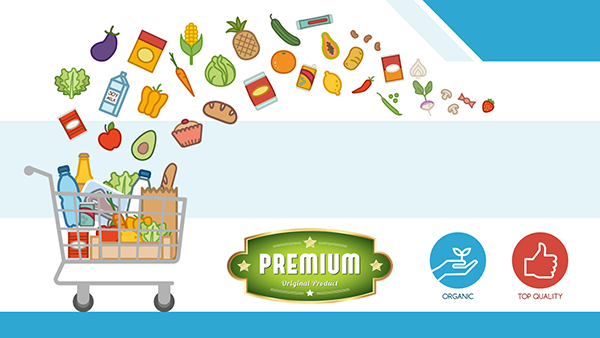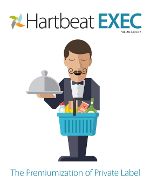AN IMPROVED ECONOMY OR A MUCH BETTER (STORE) BRAND?
 During the height of the recession it was easy (not to mention more than a bit unfair) to use the economic crisis as a scapegoat for a company’s or a brand’s poor performance. Post-recession, the U.S. economic growth situation remains sluggish, and yet we see in the food and beverage market significant growth in premium products and services.
During the height of the recession it was easy (not to mention more than a bit unfair) to use the economic crisis as a scapegoat for a company’s or a brand’s poor performance. Post-recession, the U.S. economic growth situation remains sluggish, and yet we see in the food and beverage market significant growth in premium products and services.
In matters of food and drink, America has largely returned to its pre-recession trade-up behaviors. As we’ve written before, the market-share growth of premium food and beverage brands continues to increase steadily while legacy brands pegged to highly processed formulations continue to lose share to them.
It’s also true that what was occurring pre-, during and post-recession was that the role of brands shifted as consumers’ expectations of quality continued to evolve. What does quality mean? Shoppers are just as motivated to experiment with private label products as they are to buy name brand food and beverage products.
Yet (and it’s a very big yet) one very difficult task ahead for manufacturers that dominate in brand heritage categories is to remain relevant with tomorrow’s shoppers who are heavily influenced by the changing culture of food and new quality distinctions offered to them at every turn. Quality distinction offers today’s (and tomorrow’s) shoppers one or more of the following characteristics: unique flavors, global inspiration, natural/less processed and differentiated form/texture.
 So what about the curious world of private label food and beverage? When the recession hit in 2008, there was a predictable spike in private label sales. Many wondered if it was temporary or if it portended the dawn of a new age when brands would weaken permanently in the face of a new breed of private label, like Kirkland Signature, Kroger’s Private Selection or Safeway Select.
So what about the curious world of private label food and beverage? When the recession hit in 2008, there was a predictable spike in private label sales. Many wondered if it was temporary or if it portended the dawn of a new age when brands would weaken permanently in the face of a new breed of private label, like Kirkland Signature, Kroger’s Private Selection or Safeway Select.
During the recession, one of the not-so-secret hopes in the private label industry was that accelerated, broader trial of private label in general combined with the growing reputation of store brands, like Kirkland Signature and Trader Joe’s, would be enough of an enticement for consumers to buy a “premium” quality private label food or beverage product.
Our Q2 2016 edition of Hartbeat Exec, The Premiumization of Private Label, revisits the growth trends and structure of the private label food marketplace we put forth in the 2014 Hartbeat Exec, The Future of Private Label Food. The Premiumization of Private Label examines questions like: is private label actually experiencing the post-recession price premiumization that some foretold? Private label is a competitive issue, even in historically national brand-dominated categories.
Download your free copy: The Premiumization of Private Label
Download the 2014 Hartbeat Exec: The Future of Private Label Food
